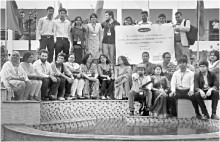Law Event
Human rights challenges underscored
Mohammad Golam sarwar
 In order to respond the emerging challenges for human rights, the capacity development of human rights defenders needs to be strategically addressed. In this regard a national training on human rights and democracy was held on 15-17 February at BCDM, Savar. Asian Forum for Human Rights and Development (FORUM-ASIA) in collaboration with Odikhar organized this training on “Consolidating Democracy and Human rights through Empowerment of Civil society”. Three day long training session was inaugurated by Fawzia Karim Firoze, Member NHRC Bangladesh on 15 February. The interactive sessions were attended by students, journalists and representatives from NGOs.
In order to respond the emerging challenges for human rights, the capacity development of human rights defenders needs to be strategically addressed. In this regard a national training on human rights and democracy was held on 15-17 February at BCDM, Savar. Asian Forum for Human Rights and Development (FORUM-ASIA) in collaboration with Odikhar organized this training on “Consolidating Democracy and Human rights through Empowerment of Civil society”. Three day long training session was inaugurated by Fawzia Karim Firoze, Member NHRC Bangladesh on 15 February. The interactive sessions were attended by students, journalists and representatives from NGOs.
The formal Sessions began with Dr. Salimullah Khan who spoke on core concept of human rights with a critique on Universal Declaration of Human Rights. He analyzed the Declaration of the Rights of Men and Citizens, 1789. This declaration basically focuses on two fundamental issues, one is Men are born and remain free and equal in rights and the other is state must help the people to enjoy their rights. The state must endeavor to ensure the rights of the people failing of which entails chaos and resistance.
Fawzia Karim Firoze, NHRC Bangladesh and Sayeed Ahmed, ASK , made an overview on Role of National Human Rights Institutions(NHRIs) in Protecting and Promoting of Human Rights and Prevention of Torture from Bangladesh perspective.
State appears as the primary actor in disregard of human rights. In this connection, the role of national human rights institutions is to bridge the gap between government and the common people, particularly with the victims of human rights violations. The establishment of the National Human Rights Commission in Bangladesh has created great expectation among the people to protect and promote human rights in an integrated way. The effectiveness and efficacy of NHRC depends much upon the political will of the government that what kind of institution that it seeks to establish and also the degree of credibility attached with the institution itself. NHRC can hardly be substitute of judiciary, rather NHRC should be seen as an institution capable of existing side by side with the judiciary and assist it in ensuring better protection of human rights.
About the situation of democracy and human rights in Bangladesh Adilur Rahman Khan, Odhikar and Farhad Mazhar, UBINIG made their deliberation. Constitution is the supreme law of the country but it has been made by elite society not by the will of the common people said Farhad Mazhar. As there is no reflection of the will of the common people, how can this constitution ensure justice for the common people, he questioned.
In Bangladesh, despite enough potential for progress, the country is still faced with lots of violence. Plenty of human rights violations are occurring frequently in different arena. Despite constitutional prohibition, arbitrary arrest is amongst the most common features of policing in Bangladesh. It is routinely accompanied by assault and extortion, and often leads to torture, killing and other grave abuses of arrested persons and others. Extra-judicial killing is still happening frequently though NHRC has put more concern about the issue, Adilur Rahman Khan remarked.
Surya Deuja from FORUM-ASIA made a presentation on Protection of the Declaration on Human Rights Defenders. He provided an overview of UN Declaration on Human Rights Defenders, EU Guidelines and FORUM-ASIA's Protection Plan of HRD for the Risk Mechanism with special focus on Treaty Bodies and Special Procedures.
About the Women Human Rights Defenders (WHRDs) Farida Akhter from Shommilito Nari Shomaj gave an overview about the WHRDs and available remedies and its application by WHRDs with illustrative example. She emphasized on the differentiation of Women rights activist and Women Human rights defenders. Taskin Fahmina of Odhikar made a presentation on UN Human Rights Mechanism with special focus on Universal Periodic Review(UPR), Treaty Bodies and Special Procedures. Saira. R. Khan Lecture of BRAC University made an overview on fundamental aspects of Optional Protocol to the Convention Against Torture (OP CAT) and tools in using it in human rights monitoring and documentation particularly in Bangladesh.
The necessity of a Regional Mechanism of Human Rights was underscored by Surya Deuja. South Asia, as one of the most polarized and poverty ridden regions in the world, is grappling with violations and abuses of human rights. A robust human rights mechanism is necessary for the protection and promotion of human rights in the region especially on common human rights issues. Such a mechanism could provide a less costly, more accessible and effective redress alternative to existing to international processes and procedures.
The writer is working with Law Desk, The Daily Star.